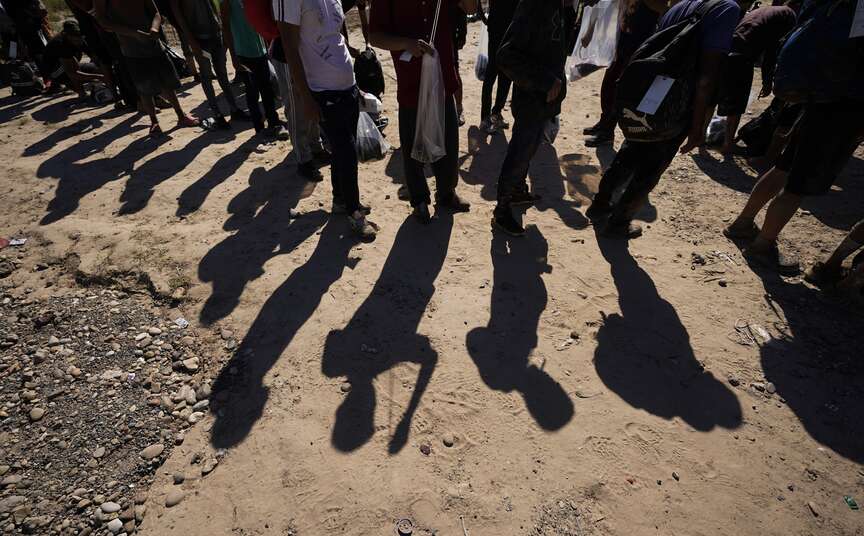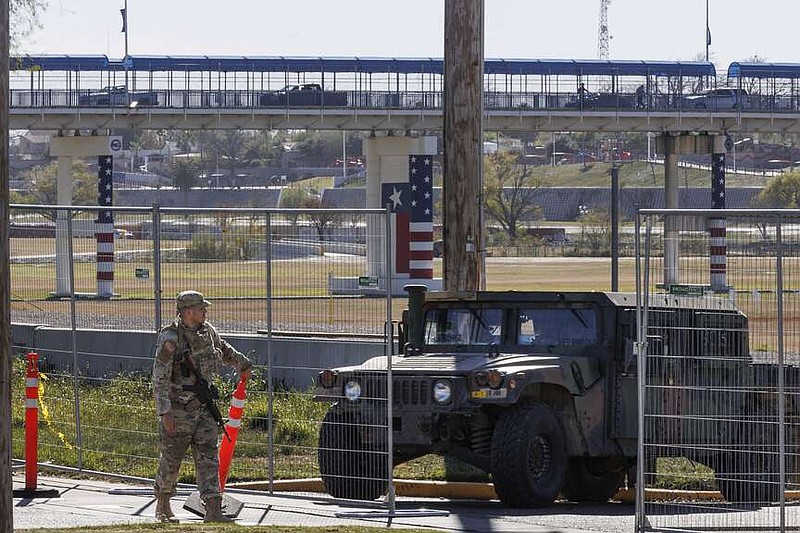NEW ORLEANS -- Texas' plans to arrest migrants suspected of illegally entering the U.S. will remain on hold under a federal appeals court order that likely prevents enforcement of Republican Gov. Greg Abbott's new immigration law until a broader decision on whether it is legal.
The 2-1 ruling late Tuesday is the second time a three-judge panel of the 5th U.S. Circuit Court of Appeals has put a temporary hold on the Texas law. It follows a confusing few hours last week when the Supreme Court allowed the law to take effect, setting off anger and anticipation along the U.S.-Mexico border.
The same panel of appeals judges will hear arguments on the law next week.
"I think what we can draw from this, from the chaos that this has been are several conclusions," said Lisa Graybill, vice president of law and policy at the National Immigration Law Center. "One is that this is clearly a controversial law. Two is that the politics of the justices on the bench are very clearly playing out in their rulings."
Texas authorities announced no arrests made under the law during that short window on March 19 before the appellate panel stepped in and blocked it.
In Tuesday's order, Chief Judge Priscilla Richman cited a 2012 Supreme Court decision that struck down portions of a strict Arizona immigration law, including arrest power. The Texas law is considered by opponents to be the most dramatic attempt by a state to police immigration since that Arizona law.
"For nearly 150 years, the Supreme Court has held that the power to control immigration -- the entry, admission, and removal of noncitizens -- is exclusively a federal power," wrote Richman, an appointee of Republican President George W. Bush. "Texas has not shown that it is likely to succeed on the merits," she said after discussing how various arguments made by the state fell short.
The Justice Department has argued that Texas' law is a clear violation of federal authority and would create chaos at the border. Texas has argued that President Joe Biden's administration isn't doing enough to control the border and that the state has a right to take action.
The Texas law, Richman wrote, "creates separate, distinct state criminal offenses and related procedures regarding unauthorized entry of noncitizens into Texas from outside the country and their removal."
She was joined in the opinion by Judge Irma Carrillo Ramirez, a Biden appointee.
In her opinion Tuesday, Richman dismissed one of Texas' most aggressive assertions: that the Texas law should be allowed to stand because the arrival of large numbers of migrants at the southern border constituted an "invasion" that triggered state war powers under the U.S. Constitution.
"Constitutional text, structure and history provide strong evidence that federal statutes addressing matters such as noncitizen entry and removal are still supreme even when the State War Clause has been triggered," she wrote, adding that Texas "has not identified any authority to support its proposition" to the contrary.
Even if aspects of the state's arrest law aligned with existing federal law, which makes it a crime to cross into the United States without authorization, Richman wrote that "what happens immediately following an arrest is in striking conflict with federal law."
The removal provision would "significantly impair the exercise of discretion" by federal immigration officials, she wrote, preventing migrants arrested from seeking asylum before being ordered by a state court to leave the country. She added that it would "cause international friction" and "risks taking the United States out of compliance with its treaty obligations."
Judge Andrew Oldham, an appointee of former President Donald Trump and a former aide to Abbott, dissented from the majority decision.
Oldham wrote that the Biden administration faced a high bar to take sovereign power that Texas has to enforce a law its people and leaders want.
"In our federal system, the State of Texas is supposed to retain at least some of its sovereignty," Oldham wrote. "Its people are supposed to be able to use that sovereignty to elect representatives and send them to Austin to debate and enact laws that respond to the exigencies that Texans experience and that Texans want addressed."
"Today's decision means that we'll likely never know how Texas' state courts and its state law-enforcement officers would have implemented S.B. 4.," Oldham added. He said he would have let the law go into effect as the appeals process moved forward and instead have the courts "wait for an actual conflict to arise between state and federal law."
SUPREME COURT
The law was in effect for several hours on March 19 after the U.S. Supreme Court cleared the way. But the high court didn't rule on the merits of the case. It instead sent the case back to the 5th Circuit, which suspended enforcement while it considered the latest appeal.
The latest ruling keeps the block in place.
Phone messages were left Wednesday seeking comment from spokespersons for Abbott and state Attorney General Ken Paxton.
The governor has said he anticipated the fight over the law's constitutionality to eventually reach the Supreme Court. Abbott has said the law, which allows the state to arrest and deport migrants on its own, is necessary to deal with the record number of migrants crossing into Texas from Mexico.
Abbott also said, in a speech this month, that the law had been tailored to challenge the high court's precedent in the 2012 case, which was decided 5-3. "We found ways to try to craft that law to be consistent" with the dissent in the Arizona case written by the late Justice Antonin Scalia, Abbott said.
Lawyers for the state could seek emergency action by the Supreme Court. Or they could let the decision stand and wait for argument, set for April 3, over the substance of the law, known as Senate Bill 4 or S.B. 4, and whether the injunction was appropriately ordered. That argument is set to be heard by the same three-judge panel.
The law signed by Abbott allows any Texas law enforcement officer to arrest people suspected of entering the country illegally. Once in custody, migrants could either agree to a Texas judge's order to leave the U.S. or be prosecuted on misdemeanor charges of illegal entry. Migrants who don't leave could face arrest again under more serious felony charges.
Authorities have offered various explanations for how they might enforce the law. Mexico has said it would refuse to take back anyone who is ordered by Texas to cross the border.
The brief window while the law was in effect revealed that many sheriffs were unprepared, unable or uninterested in enforcing it.
Sheriff Thaddeus Cleveland of Terrell County, which touches more than 50 miles of border, told The Associated Press last week that there's no practical way for him to enforce the law. Cleveland said he has no way to transport people, the county jail has space for just seven people and the closest port of entry is a drive of more than 2 1/2 hours away.
Smith County Sheriff Larry Smith, president of the Texas Sheriff's Association, said the law will have little effect in his jurisdiction in East Texas, which is closer to Louisiana and Oklahoma than to Mexico which is nearly 400 miles away.
Critics have said the Texas law could lead to civil rights violations and racial profiling.
Supporters have rejected those concerns, saying arresting officers must have probable cause, which could include witnessing the illegal entry or seeing it on video. They also say that they expect the law would be used mostly in border counties, though it would apply statewide.
Information for this article was contributed by Kevin McGill, Ken Miller and Elliot Spagat of The Associated Press and by J. David Goodman of The New York Times.
 FILE - Migrants wait to be processed by the U.S. Customs and Border Patrol after they crossed the Rio Grande and entered the U.S. from Mexico, Oct. 19, 2023, in Eagle Pass, Texas. A Texas law that allows the state to arrest and deport migrants suspected of illegally entering the U.S. will remain on hold for now, a federal appeals court ruled. The order late Tuesday, March 26, 2024, from the 5th U.S. Circuit Court of Appeals followed a March 20 hearing by a three-judge panel of the court. It's just the latest move in a seesaw legal case that is not yet over. (AP Photo/Eric Gay, File)
FILE - Migrants wait to be processed by the U.S. Customs and Border Patrol after they crossed the Rio Grande and entered the U.S. from Mexico, Oct. 19, 2023, in Eagle Pass, Texas. A Texas law that allows the state to arrest and deport migrants suspected of illegally entering the U.S. will remain on hold for now, a federal appeals court ruled. The order late Tuesday, March 26, 2024, from the 5th U.S. Circuit Court of Appeals followed a March 20 hearing by a three-judge panel of the court. It's just the latest move in a seesaw legal case that is not yet over. (AP Photo/Eric Gay, File)